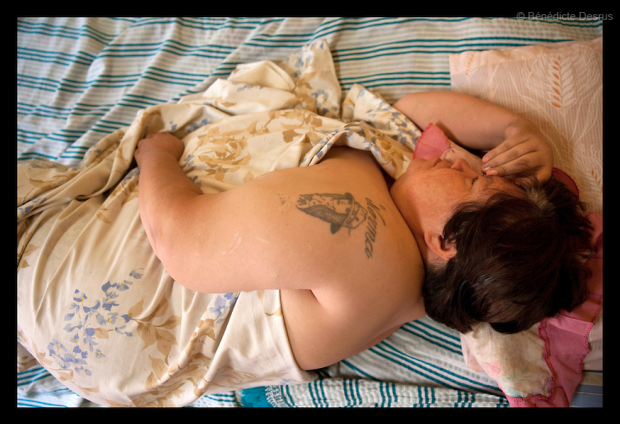
Diana Kingsley, “Well-Rounded Wives”, www.dianakingsley.com. A notable entry in the Theo Westenberger Photography Prize. The winner will be announced at midnight tonight.
Theo Westenberger’s career can only be described as massively successful. She was the first woman photographer to have her work featured on the covers of Sports Illustrated and Newsweek. Her photo of Steve Martin, for which she is well known, is one that is embedded in our cultural consciousness; in it he wears a suit and holding flowers while walking off a diving board. This is just one of seemingly countless famed photographs of public figures and stars. She shot Judge Judy looking incredulous at her courtroom. She shot the eerie hand painted photograph of a California pool, many of us have seen, but may not connect with Westenberger.
What many may not know about Westenberger is that she wanted to make art. She had an MFA from Pratt and she planned to one-day return solely to studio work. Tragically, that never happened. Theo Westenberger died in 2008 of lung cancer leaving behind a legacy fund of great significance; she decided the funds that would have supported her own artistic practice should support the causes that she trumpeted during her lifetime: exposure for women artists, animals and the underserved.
And now that’s exactly what the Theo Westenberger Estate does. In their six short years of operation, the estate has catalogued a collection of 220,000 images and created named fellowships at the Creative Capital Foundation, the Laundromat Project, The Autry National Center and offered direct individual grants. This April, they announced a $1 million dollar gift to Creative Capital to endow THEO WESTENBERGER named grants and to support a loan fund for artists and filmmakers who are Creative Capital alumni. On March 29th, they also launched the Theo Westenberger Photo Contest, a $5,000 cash prize and licensing opportunity that will be awarded six times yearly to outstanding women photographers. The first winner of that prize will be announced tonight at midnight.
Given the timing of the prize, I wanted to hear more from Estate Executor Colleen Keegan, and staff artists Molly Butcher and Dominic Jones.
Paddy Johnson: Tell me a bit about Theo Westenberger and what the estate does to support women artists, animals and the environment.
Colleen Keegan: Theo Westenberger was an extraordinary artist and person. She considered herself fortunate and was grateful for the opportunities that she was given and for the commercial success that financed her artwork. She focused on creating opportunities for other women artists and those more vulnerable.
We’re pretty excited about our grantees and the Facebook photography contest we’re running now. The contest prizes are $5,000 awards and the opportunity to license that photograph. On the Facebook page we feature articles, residency and funding information and selected writings from women artists. Our goal is to give women recognition and to create a community for photographers.
I think it’s also very important that everyone who works for the estate is an artist.
PJ: What is the difference between a legacy fund and a foundation?
CK: A foundation is established to go on as an entity in perpetuity. The legacy fund generates endowed grants and programs placed at extraordinary institutions that support both Theo Westenberger’s wishes and the funded organizations. The fund itself has no real expenses. There are minimal accounting and legal fees, but there’s no office and minimal overhead. We use revenues from sales and licensing fees from Westenberger’s photographs to fund grants and programs. The contest enables us to support artists directly and indirectly and to raise our visibility, which will enable us to broaden our licensing program and generate more money to increase our grants.
PJ: How common are legacy funds?
CK: We don’t know of another that operates exactly like this, but there may be many.
PJ: You have a new writing program. When was this started?
Molly Butcher: We’ve been doing it for about two months. The goal is to publish about one piece a week. We started out by commissioning the Theo Westenberger Grantees and recently have begun reaching out to people who have entered the contest, and people in different stages of their career in the art world.
In keeping with the mission, we’re commissioning artists to write pieces they’re interested in writing.
Dominic Jones: We have a Theo Westenberger Facebook page that I post different articles, and images to each day.
With our photo contest, we’ve received amazing work from all over the world, from Scandinavia, to Poland, to Belarus…and their work has been featured by places like The Huffington Post, Time and National Geographic..We’re trying to raise awareness for all female artists and women, so we’re posting the notable entries on Facebook and a collection of those will eventually be featured in a book and curators have agreed to view all the entries.. So exposure doesn’t just stop at the photo contest.
A panel of judges looks at the initial submissions, and then whittles them down to a few notable entries that we feature on our Facebook page each week.
CK: The finalist—the winner, is judged by one past winner of the Theo Westenberger Award. They judge from all of them, not just the notable entries.
As Dominic has said, the breadth of applicants has been really surprising. The quality of the applications has been really consistent. And we want to encourage people to enter. They do not have to be professional photographers or even people who consider themselves artists. We do not make the distinction. They just have to be women.
PJ: Why have the entries been so strong? Does that have to do with your outreach or the legacy of Theo Westenberger?
DJ: I think the fact that we don’t tell the winner what to do with $5,000 cash prize is very appealing.
CK: And I do think it has to do with Theo Westenberger’s legacy; we received submissions from a lot of people who worked with her or knew of her. Outreach through the Creative Capital grantees, Ted Fellows and Art organizations has helped too; it has brought in people who are extraordinary, and that’s set a tone.



Comments on this entry are closed.